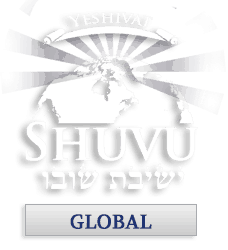שְׁמַ֖ע יִשְׂרָאֵ֑ל יְהֹוָ֥ה אֱלֹהֵ֖ינוּ יְהֹוָ֥ה | אֶחָֽד: וְאָ֣הַבְתָּ֔ אֵ֖ת יְהֹוָ֣ה אֱלֹהֶ֑יךָ בְּכָל־לְבָֽבְךָ֥ וּבְכָל־נַפְשְׁךָ֖ וּבְכָל־מְאֹדֶֽךָ: וְהָי֞וּ הַדְּבָרִ֣ים הָאֵ֗לֶּה אֲשֶׁ֨ר אָֽנֹכִ֧י מְצַוְּךָ֛ הַיּ֖וֹם עַל־לְבָבֶֽךָ: וְשִׁנַּנְתָּ֣ם לְבָנֶ֔יךָ וְדִבַּרְתָּ֖ בָּ֑ם בְּשִׁבְתְּךָ֤ בְּבֵיתֶ֨ךָ֙ וּבְלֶכְתְּךָ֣ בַדֶּ֔רֶךְ וּבְשָׁכְבְּךָ֖ וּבְקוּמֶֽךָ: וּקְשַׁרְתָּ֥ם לְא֖וֹת עַל־יָדֶ֑ךָ וְהָי֥וּ לְטֹֽטָפֹ֖ת בֵּ֥ין עֵינֶֽיךָ: וּכְתַבְתָּ֛ם עַל־מְזֻז֥וֹת בֵּיתֶ֖ךָ וּבִשְׁעָרֶֽיךָ:
Hear, O Israel: The Lord is our God; the Lord is one. And you shall love the Lord, your God, with all your heart and with all your soul, and with all your means. And these words, which I command you this day, shall be upon your heart. And you shall teach them to your sons and speak of them when you sit in your house, and when you walk on the way, and when you lie down and when you rise up. And you shall bind them for a sign upon your hand, and they shall be for ornaments between your eyes. And you shall inscribe them upon the doorposts of your house and upon your gates.
Deuteronomy 6:4-9
This week’s Torah portion contains a restatement of the Dibraya and the Shema. In Mark 12, Yeshua is asked by a Torah teacher to single out the most important mitzvah. Yeshua had just been in the process of destroying the theology of the Sadducees. This is something Yeshua never did to the Pharisees. He was a check against the Pharisees consistently about their hypocritical behavior, Yeshua never objected to their theology.
Consequently, as he who is approached with this question, the Torah teacher does so in a friendly manner. The Torah teacher’s question to Yeshua’s ends in a very positive way. Yeshua’s answer fit well into the pharisaic understanding and theology.
At first glance, Yeshua’s response is to quote from Deuteronomy 6:4-5. However, Yeshua does not quote the Torah exactly. Here Yeshua includes the concept of mind or understanding. As it is a violation to add to Torah, we know this is not what Yeshua was doing. Instead, Yeshua was interpreting and explaining Torah. This is the very definition of Oral Law.
The Torah teacher, because he was a teacher of Torah, was not stupid. He knew Yeshua did not quote the Torah. The Torah teacher was perfectly fine with Yeshua giving an Oral Law interpretation and understanding of the Torah text. For the Torah teachers and the Pharisees, the purpose of Oral Law was to give interpretation and understanding to the Tanakh. Shabbat shalom
